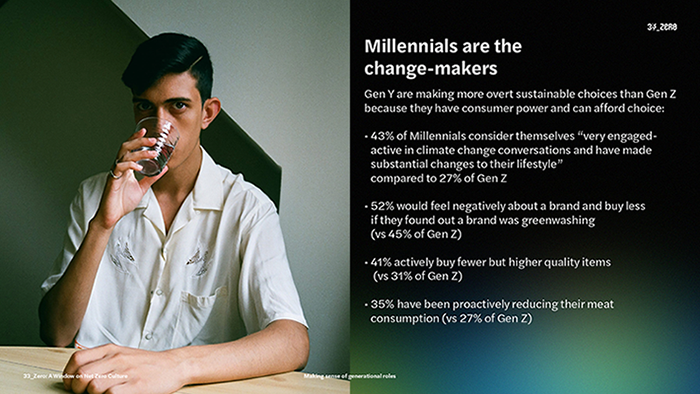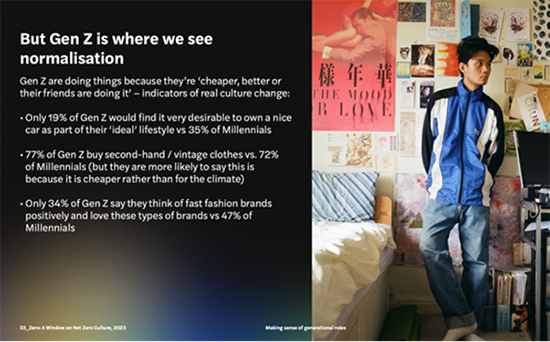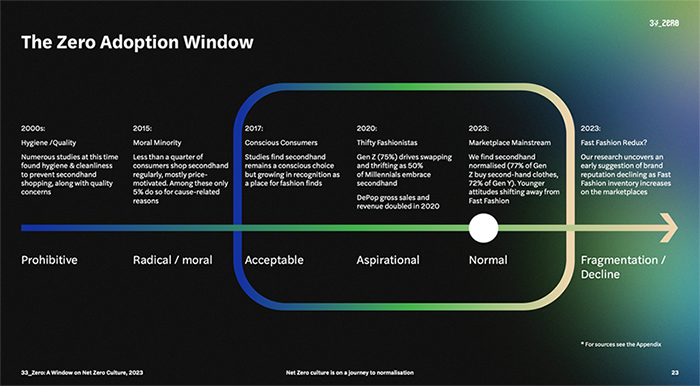The numbers say Gen Z doesn’t shop with a green conscience. But cultural change may show as a lag in the stats until it’s too late, says James Poletti, Strategy Partner, 33_Zero – a newly launched strategy consultancy which supports brands and tech companies to thrive in a Net Zero culture.
Recent research into the impact of environmental beliefs on consumer behaviour appears to pour cold water on the assumption that it is younger cohorts who shop with their consciences. Yet, what we found from a comprehensive survey of 2,000 Gen Y and Z planet-conscious consumers across the UK and US should be a warning to brands who take the numbers at face value; in doing so they risk missing the much bigger story coming down the line.
That is, while Millennials are at a life stage with more accountability for significant consumer choices – and often with more income to invest in conscious decision-making – we see evidence that Gen Z is where irreversible cultural changes will take hold.
If many Millennials are overt sustainability shoppers, Gen Z are doing things because they are cheaper, better or their friends are doing it. In other words, their change-making agency is unconscious. And for that reason, it is far more impactful, the result of motivations they often won’t express as ‘sustainable’ or ‘environmentalist’. These imperceptible but emphatic shifts are where we see signs of cultural change.


A recent report from Mail Metro Media estimates just 0.5m Gen Z fall within a segment whose purchase decisions are heavily impacted by sustainability, compared with 0.7m of Millennials. This correlates with our findings among a group that expressed sustainability as a least ‘somewhat of a priority’, we found:
- Half of Millennials (43%) claimed to have made ‘substantial changes in their lifestyle’ due to climate change, compared to just 27% of Gen Z
- 41% of Millennials actively buy ‘fewer but higher quality items’ in a bid to be more sustainable, whereas only 31% of the Gen Z respondents admitted to shopping this way
Now, put aside questions that address overt behavioural choices made at the checkout and consider that 77% of Gen Z buy second-hand clothes but are more likely to claim this is because of price than environment. Or that only 19% of Gen Z find it desirable to own a nice car as part of their ‘ideal’ lifestyle versus 35% of Millennials.
Attitudes toward fashion brands are shifting too. Only 34% of Gen Z think positively of fast fashion brands versus 47% of the Millennials we spoke to. And, despite their love of fashion marketplaces, in qualitative deep dives with Gen Z members of our Earthtopia TikTok community, we even heard the beginnings of a shift in tone here.
“Depop is a minefield of Shien clothes which have been resold for more money than they were bought for originally!” 17-year-old Fatiha told us, in one interview.
Brands can content themselves that the cold, hard numbers suggest they’ve little to worry about from a Gen Z uprising at the checkout. But anyone who watches the mercurial shifts of culture knows these changes are hard to find in the quant, yet can be far more damaging to business and category perception when the lag effects suddenly catch up.
This is what led us to draw on a model popular in political strategy – the Overton Window – used to chart the nebulous winds of change in acceptable political discourse, wherein a policy or idea moves from an ‘unthinkable’ fringe position to ultimately become popularised. Cultural change, we believe, follows a similar path to the passage of popular political discourse in regard to changing attitudes around sustainability.
Hence, we illustrate a shifting cultural mindset that moves from consciously moral consumer choices at the fringe, to ultimately become normalised behaviour – much as we have seen with second-hand fashion.
And, like policy discourse, a popularised idea can pass out of the window of acceptability as it is weakened by conflicting forces within culture. Think of how plant-based meat alternatives plateaued as a critical mass failed to take them to the next level, or the risk we see coming into view for fashion marketplaces overwhelmed by Shein.

The Zero Adoption Window, illustrated here with the example of fashion marketplaces
2023 was not the paradigm shift many of us expected where brand value came face-to-face with its negative externalities in the climate accounting ledger. In retrospect, this isn’t surprising given other findings in our research: 96% of our respondents were negatively impacted in their ability to make a sustainable choice due to the increase in cost of living, with 49% saying it has had a big impact, meaning they have to prioritise cost over everything else.
Where fashion is concerned, the youngest are the most influential. Yet Gen Z has 80% less purchasing power than Baby Boomers did when they were in their 20s. It’s estimated they have more student debt than Millennials and have been hit harder by inflation. A study by Deloitte also highlighted that almost half said they were living payday to payday.
To borrow language from the Reuters Institute for the Study of Journalism, Gen Z may be ‘activists’ for climate but they lack the means to be ‘investors’ in climate.
But what does this mean for brands and how can they respond?
If 2023 saw brands place an intense climate focus anywhere, it was on the risks associated with ‘greenwashing’ as story after story exposed tactical ‘activist’ messaging gone wrong in the face of failures to strategically ‘invest’ in genuine change. But brands can’t look away.
Culture is changing. If you want to see it happening, undertake qualitative dives amongst the young. Most brands aren’t moving on from tactical statements in support of climate to real investment in change. That’s because of understandable fears. And that responsibility is a heavy cross to bear for senior marketers alone in the organisation. So, appoint a Head of Climate Science. Or seek third-party benchmarking of your activity. Research the change-makers and keep watching so you’re ahead of the data.
The full ‘Window on Net Zero Culture’ report can be downloaded here.

